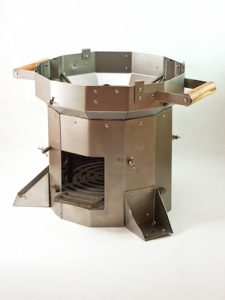
Agriculture
December 31, 2023
Berkeley-Darfur Stove V.14
Read SolutionImplemented by
Potential Energy
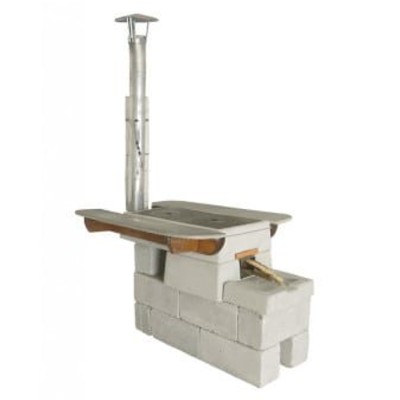
Updated on December 27, 2023
·Created on October 5, 2018
The ONIL is a semi-portable plancha-type cookstove that has concentric removable rings to also heat pots directly.
The ONIL is a plancha-type cookstove developed by HELPS International with help from Dallas engineer Don O’Neil. The stove has a chimney, rocket elbow combustion chamber and an iron plancha that features concentric removable rings to heat pots directly.
only 5% of the stoves marketed are purchased directly by customers. The majority of the ONIL stoves are given for free or with just a small contribution by the beneficiary. NGOs, foundations, governments, or businesses with social responsibility hold 85% of ONIL stoves market sales. The remaining 10% are purchased through micro-credits granted by Banrural. Customers interested in obtaining a stove only need to open an account that costs 13 USD, and have their identification card (DPI), and the NIT (fiscal identity number). Additionally, HELPS International seeks carbon-credit funds via CDM for its sales in Guatemala and Mexico.
Target SDGs
SDG 7: Affordable and Clean Energy
SDG 3: Good Health and Well-Being
Market Suggested Retail Price
$150.00
Target Users (Target Impact Group)
Household, Community
Distributors / Implementing Organizations
HELPS International, Shell Foundation and Fundación Solar.
Competitive Landscape
Direct competitors include Estufa Palermo, Ecostufa, Burro Gari Elephant, Chispa Hogar, and EcoZoom Plancha.
Countries
Guatemala, Honduras, Mexico, Nicaragua
Manufacturing/Building Method
The stove is mass-produced within 100 km of Guatemala City. Its concrete, ceramic and steel parts are manufactured by different local enterprises but assembled in situ by HELPS International.
Intellectural Property Type
Trademark
User Provision Model
Users can obtain the product directly from the manufacturer or through donations from partner NGOs.
Distributions to Date Status
More than 240,000 stoves have been installed.
Fuel type
Firewood
Chimney (yes/no)
Yes
Forced or passive
Passive
Pot type
Both
Pot capacity (L)
Unknown
Thermal efficiency (%)
15%
PM emissions (g/MJ delivered to pot)
879 mg/MJ-del
CO emissions (g/MJ delivered to pot)
6 g/MJ-del
Time to boil (min/L)
50.7 mins / 5 L
Design Specifications
The ONIL is a plancha cookstove with a rocket-type combustion chamber and a chimney. The top of the stove is composed by two steel hot plates that fit into three sixteenth-inch steel top plates. The surface area is sufficient for two pots, for which a set of covers with graduated holes are incorporated in the design to allow different pot sizes to fit completely. The combustion chamber uses fired clay as a refractory material; while ground pumice and ash are used as the stove’s insulating material. This insulating material is placed between the ceramic combustion chamber and the main body parts that are made from cast concrete. The stove is mounted on concrete blocks to obtain a convenient height for cooking. For its chimney galvanized sheet metal steel is used with an incorporated wire mesh cylinder to prevent thermal burn accidents.
Specifications:
Technical Support
Manufacturers offer installation visits and a hotline to answer questions and solve problems.
Replacement Components
Unknown
Lifecycle
10 years
Manufacturer Specified Performance Parameters
Manufacturers specify a reduction of 70% in wood consumption and a gain of two days a week in time saved from gathering wood as their performance targets.
Vetted Performance Status
A case study was carried out between 2002 and 2006 by Baylor University Medical Center, Puesto de Salud in Guatemala, and the Department of Public Health from the Medical College of Wisconsin in Santa Avelina, Quiche, Guatemala. In that same period of time more than 90% of homes in Santa Avelina had an ONIL stove installed. The study compared the number of clinic visits per year for acute upper and lower respiratory illnesses for the years 2002 and 2006. They identified that upper and lower respiratory illnesses as well as acute lower respiratory decreased by 26% and 45% respectively. The study suggested that the placement of an improved vented stove may be associated with a corresponding decrease in acute respiratory illnesses. A 2008 baseline and a 2009 follow-up survey was carried out by researchers from the University of San Francisco on 2,148 individuals in 351 households. The survey, which evaluated wood consumption and indoor air pollution, showed that with the ONIL stoves the wood consumption decreased by 59.1% and indoor air related health problems were reduced by 48.6% among women and 63.3% among children. Complies with all relevant UNFCC requirements for the Clean Development Mechanism. Complies with the following cookstoves rating for the International Workshop Agreements as a streamlined process of the International Organization for Standarization (ISO) :
Safety
The safety concerns associated with the usage of wood-burning cookstoves are primarily related with carbon dioxide, carbon monoxide and sulfur dioxide emissions.
Another significant safety concern is domestic accidents such as accidental burning or spill-overs.
Complementary Technical Systems
Side tables to prepare food.
Academic Research and References
Harris, S., Weeks J., Chen, J. & Layde P., 2011, “Health effects of an efficient vented stove in the highlands of Guatemala.”, Global Public Health: An International Journal for Research, Policy and Practice, 6:4, pp. 421-432.
Ludwinski, D., Moriarty, K. & Wydick, B., 2011, “Environmental and health impacts from the introduction of improved wood stoves: evidence from a field experiment in Guatemala.”, Environmental, Development and Sustainability, 13, pp. 657–676.
Medina, P., Berrueta, V., Martínez, M., Ruiz, V., Edwards, R. & Masera, O., 2017, ” Comparative performance of five Mexican plancha-type cookstoves using Water Boiling Tests. “, Development Engineering. 2, pp. 20-28.
Wang, X., Franco, J., Masera, O., Troncosco, K. & Rivera, M., 2013, “What Have We Learned about Household Biomass Cooking in Central America?,” Washington DC.
Lambe, F. & Ochieng, C., 2015, “Improved Cookstoves in Central America:”, Health Impacts and Uptake, Stockholm Environment Institute.
International Standards Organization (ISO). n.d. ISO’s International Workshop Agreements.
Global Alliance for Clean Cookstoves. 2013. Interim Reporting Requirements for IWA Tiers of Performance. cleancooking.org. Global Alliance for Clean Cookstoves.
GlobalGiving . n.d. The ONIL Stove. globalgiving.org. GlobalGiving.
International Standards Organization (ISO). n.d. Home. iso.org. ISO.
Clean Cooking Alliance – Clean Cooking Catalog: Results Report – Onil Stove. n.d. www.catalag.cleancookstoves.org. Global Alliance for Clean Cookstoves.
Weary, Ken. 2015. $150 Stove That Transforms Lives. Sunglasses Required. March 19, 2015.
CDM: Up Energy Improved Cookstove Programme, Uganda. 2011. cdm.unfccc.int. CDM.
AMS-II.G.: Energy Efficiency Measures in Thermal Applications of Non-Renewable Biomass — Version 9.0. n.d. cdm.unfccc.int. CDM.
Global Alliance for Clean Cookstoves . 2014. The Water Boiling Test (Version 4.2.3): Cookstoves Emissions and Efficiency in a Controlled Laboratory Setting. www.1library.net. Global Alliance for Clean Cookstoves.
Helps International . n.d. Community Development: Helping Create Healthier Homes and Schools. www.helpsintl.org. Helps International.
Compliance with regulations
Unknown
Evaluation methods
Baseline and monitoring methodology AMS-II.G “Energy efficiency measures in thermal editions of non-renewable biomass”, version 05.
Water Boiling Test 4.2.3.
Other Information
HELPS International also manufactures and distributes a Gravity Water Filter.

Agriculture
December 31, 2023
Implemented by
Potential Energy
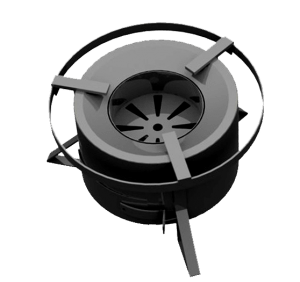
Agriculture
November 19, 2024
Implemented by
Kenya Stove Works Ltd.
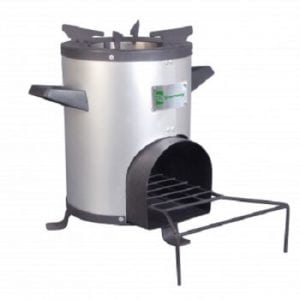
Agriculture
December 3, 2024
Implemented by
Greenway
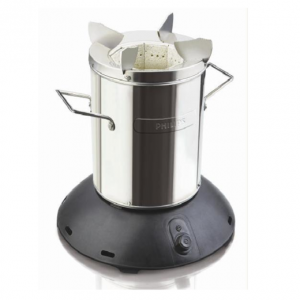
Agriculture
November 30, 2024
Implemented by
Philips
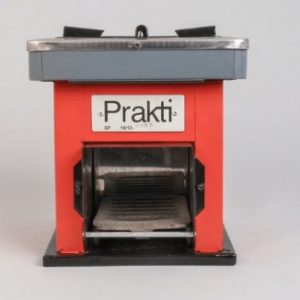
Agriculture
November 19, 2024
Implemented by
Prakti Design
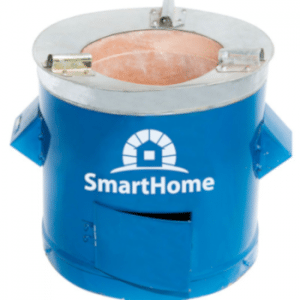
Agriculture
December 27, 2023
Implemented by
Green Bio Energy
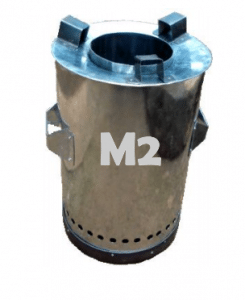
Agriculture
December 28, 2023
Implemented by
Wisdom Stoves
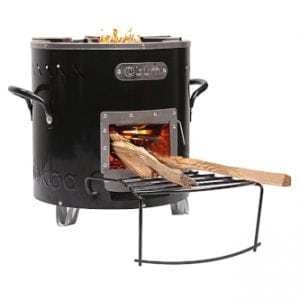
Agriculture
January 10, 2024
Implemented by
BURN Design Lab
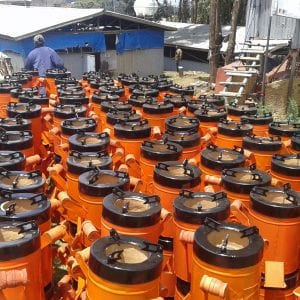
Agriculture
December 3, 2024
Implemented by
Gogle
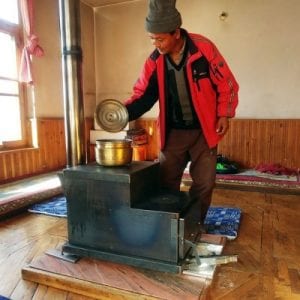
Agriculture
December 28, 2024
Implemented by
Himalayan Rocket Stove Pvt. Ltd.
Have thoughts on how we can improve?
Give Us Feedback